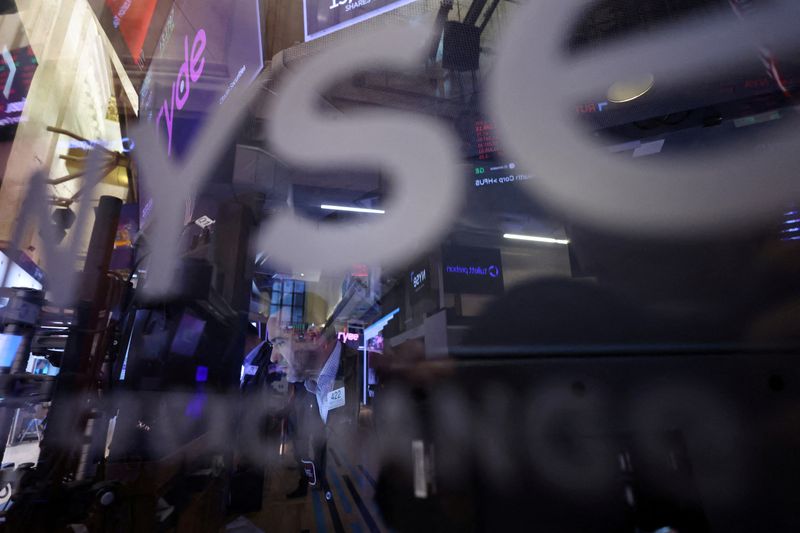Select Language

Investing.com -- It’s set to be a big week for markets with the Federal Reserve, the Bank of England and the Bank of Japan all set to hold policy meetings. Also in the spotlight will be Friday’s U.S. jobs report and more big tech earnings results. Here's your look at what's happening in markets for the week ahead.
1. Fed decision
With markets currently pricing in an 88% chance of a September rate cut amid signs of cooling inflation and an uptick in the unemployment rate this week’s policy statement by Fed Chair Jerome Powell will be firmly in the spotlight.
The Fed, which concludes its July policy meeting on Wednesday, has said it wants to be confident inflation is moving sustainably towards its 2% target before cutting interest rates.
Inflation data on Friday underscored expectations for the U.S. central bank to set the stage for a September rate cut this week.
The Fed has maintained its benchmark overnight interest rate in the current 5.25%-5.50% range since last July. It has hiked its policy rate by 525 basis points since 2022.
2. Nonfarm payrolls
Wednesday’s Fed statement will put the already closely watched nonfarm payrolls report, due out on Friday, under heightened scrutiny as investors try to gauge whether recent signs of cooling in the labor market continued in July.
Economists are expecting the U.S. economy to have created 177,000 jobs in July, moderating from 206,000 in the prior month.
The unemployment rate, which has ticked higher in each of the past three months, is expected to hold steady at 4.1%.
Ahead of Friday’s report the U.S. will release data on JOLTS job openings on Tuesday.
3. Big tech earnings continue
Big Tech earnings are set to continue in the coming days and any disappointments could potentially further roil markets already on edge amid worries over stretched stock valuations.
Microsoft (NASDAQ:MSFT) is scheduled to report earnings on Tuesday, followed by Facebook-parent Meta (NASDAQ:META) on Wednesday and Apple (NASDAQ:AAPL) and Amazon (NASDAQ:AMZN) on Thursday.
Disappointing numbers could re-ignite the worries that caused a bruising selloff in U.S. stocks on Wednesday, when both the S&P 500 and Nasdaq suffered their worst day since late 2022.
The huge run-up in tech stocks may have set a high bar for their results. Google-parent Alphabet (NASDAQ:GOOGL) whose earnings were one of the triggers for the selloff, actually reported better-than-expected revenue, but investors grew wary that rising spending on AI infrastructure could squeeze margins, sending shares 5% lower.
4. Bank of England meeting
The BoE meets on Thursday with investors divided over whether policymakers will deliver their first rate cut since 2020.
The level of uncertainty is higher than usual in the run-up to the meeting as key central bank officials have not spoken publicly for over two months due to rules in the lead up to Britain’s July 4's general election.
Investors have been left guessing whether recent higher-than-expected service price inflation is enough to prevent the BoE cutting rates from their 16-year high of 5.25%.
Last month, the BoE's Monetary Policy Committee voted 7-2 to keep rates on hold, but minutes of the decision recorded that it had been a "finely balanced" decision for some of the policymakers who had not voted for a cut.
5. Bank of Japan decision
The BOJ concludes its latest policy setting meeting on Wednesday and speculation over the prospect of a rate hike is mounting after high-profile politicians, including the prime minister, hinted at the need for near-term policy normalisation.
The impact of the weak yen on household and business spending appears to be turning the exchange rate into a central issue for the ruling Liberal Democratic Party's leadership convention in September.
The fact that the currency has rebounded by a staggering 10 yen per dollar from three-decade lows at the start of the month hasn't deterred some from predicting a July hike.
They argue the BOJ can get the most bang for its buck by hiking into a rallying yen. Others worry a fragile economy and weak consumer sentiment couldn't weather higher borrowing costs, with slowing U.S. growth set to have a knock-on effect already.
--Reuters contributed to this report

